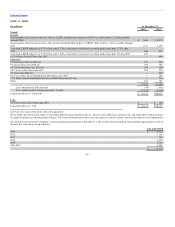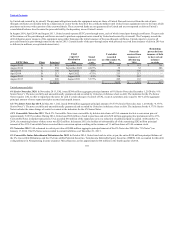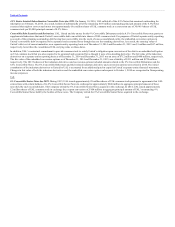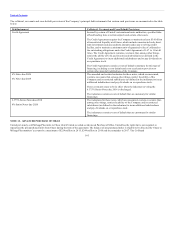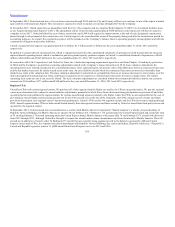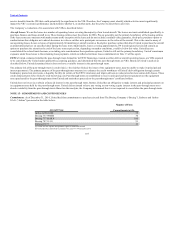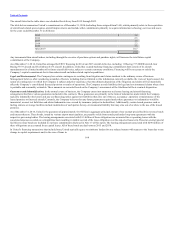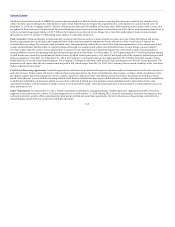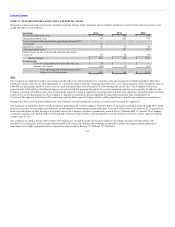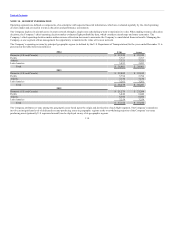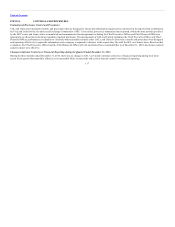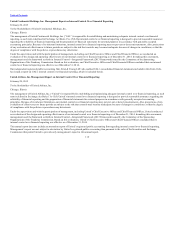United Airlines 2014 Annual Report Download - page 109
Download and view the complete annual report
Please find page 109 of the 2014 United Airlines annual report below. You can navigate through the pages in the report by either clicking on the pages listed below, or by using the keyword search tool below to find specific information within the annual report.
Table of Contents
which the interest rate is based on LIBOR, for certain other increased costs that the lenders incur in carrying these loans as a result of any change in law,
subject in most cases to obligations of the lenders to take certain limited steps to mitigate the requirement for, or the amount of, such increased costs. At
December 31, 2014, the Company had $2.5 billion of floating rate debt and $159 million of fixed rate debt, with remaining terms of up to twelve years, that
are subject to these increased cost provisions. In several financing transactions involving loans or leases from non-U.S. entities, with remaining terms of up to
twelve years and an aggregate balance of $2.7 billion, the Company bears the risk of any change in tax laws that would subject loan or lease payments
thereunder to non-U.S. entities to withholding taxes, subject to customary exclusions.
Fuel Consortia. United participates in numerous fuel consortia with other air carriers at major airports to reduce the costs of fuel distribution and storage.
Interline agreements govern the rights and responsibilities of the consortia members and provide for the allocation of the overall costs to operate the
consortia based on usage. The consortia (and in limited cases, the participating carriers) have entered into long-term agreements to lease certain airport fuel
storage and distribution facilities that are typically financed through tax-exempt bonds (either special facilities lease revenue bonds or general airport
revenue bonds), issued by various local municipalities. In general, each consortium lease agreement requires the consortium to make lease payments in
amounts sufficient to pay the maturing principal and interest payments on the bonds. As of December 31, 2014, approximately $1.4 billion principal amount
of such bonds were secured by significant fuel facility leases in which United participates, as to which United and each of the signatory airlines has provided
indirect guarantees of the debt. As of December 31, 2014, the Company’s contingent exposure was approximately $239 million principal amount of such
bonds based on its recent consortia participation. The Company’s contingent exposure could increase if the participation of other air carriers decreases. The
guarantees will expire when the tax-exempt bonds are paid in full, which ranges from 2015 to 2041. The Company did not record a liability at the time these
indirect guarantees were made.
Credit Card Processing Agreements. United has agreements with financial institutions that process customer credit card transactions for the sale of air travel
and other services. Under certain of United’s credit card processing agreements, the financial institutions either require, or under certain circumstances have
the right to require, that United maintains a reserve equal to a portion of advance ticket sales that has been processed by that financial institution, but for
which United has not yet provided the air transportation. Such financial institutions may require additional cash or other collateral reserves to be established
or additional withholding of payments related to receivables collected if United does not maintain certain minimum levels of unrestricted cash, cash
equivalents and short term investments. United’s current level of unrestricted cash, cash equivalents and short term investments is substantially in excess of
these minimum levels.
Labor Negotiations. As of December 31, 2014, United, including its subsidiaries, had approximately 84,000 employees. Approximately 80% of United’s
employees were represented by various U.S. labor organizations as of December 31, 2014. During 2014, United’s maintenance instructor, load planner, fleet
technical instructor, security officer and dispatcher work groups ratified new joint labor agreements. We are in the process of negotiating joint collective
bargaining agreements with our technicians and flight attendants.
109


